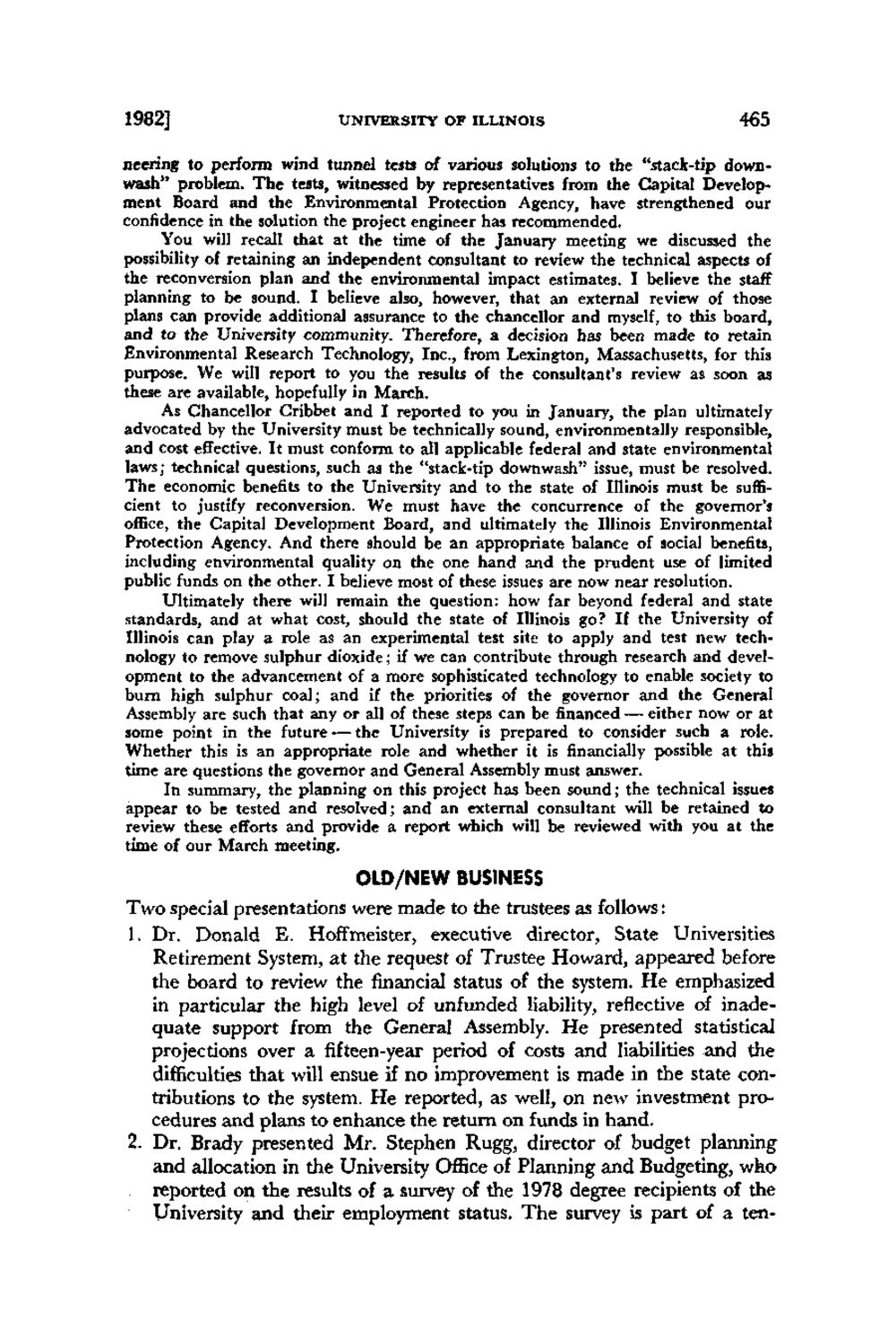| |
| |
Caption: Board of Trustees Minutes - 1982
This is a reduced-resolution page image for fast online browsing.

EXTRACTED TEXT FROM PAGE:
1982] UNIVERSITY OF ILLINOIS 465 neering to perform wind tunnel tests of various solutions to the "stack-tip downwash" problem. T h e tests, witnessed by representatives from the Capital Development Board and the Environmental Protection Agency, have strengthened our confidence in the solution the project engineer has recommended. You will recall that at the time of the January meeting we discussed the possibility of retaining an independent consultant to review the technical aspects of the reconversion plan and the environmental impact estimates. I believe the staff planning to be sound. I believe also, however, that an external review of those plans can provide additional assurance to the chancellor and myself, to this board, and to the University community. Therefore, a decision has been made to retain Environmental Research Technology, Inc., from Lexington, Massachusetts, for this purpose. We will report to you the results of the consultant's review as soon as these are available, hopefully in March. As Chancellor Cribbet and I reported to you in January, the plan ultimately advocated by the University must be technically sound, environmentally responsible, and cost effective. It must conform to all applicable federal and state environmental laws; technical questions, such as the "stack-tip downwash" issue, must be resolved. The economic benefits to the University and to the state of Illinois must be sufficient to justify reconversion. We must have the concurrence of the governor's office, the Capital Development Board, and ultimately the Illinois Environmental Protection Agency. And there should be an appropriate balance of social benefits, including environmental quality on the one hand and the prudent use of limited public funds on the other. I believe most of these issues are now near resolution. Ultimately there will remain the question: how far beyond federal and state standards, and at what cost, should the state of Illinois go? If the University of Illinois can play a role as an experimental test site to apply and test new technology to remove sulphur dioxide; if we can contribute through research and development to the advancement of a more sophisticated technology to enable society to burn high sulphur coal; and if the priorities of the governor and the General Assembly are such that any or all of these steps can be financed — either now or at some point in the future — the University is prepared to consider such a role. Whether this is an appropriate role and whether it is financially possible at this time are questions the governor and General Assembly must answer. In summary, the planning on this project has been sound; the technical issues appear to be tested and resolved; and an external consultant will be retained to review these efforts and provide a report which will be reviewed with you at the time of our March meeting. OLD/NEW BUSINESS Two special presentations were made to die trustees as follows: 1. Dr. Donald E. Hoffmeister, executive director, State Universities Retirement System, at the request of Trustee Howard, appeared before the board to review the financial status of the system. He emphasized in particular the high level of unfunded liability, reflective of inadequate support from the General Assembly. He presented statistical projections over a fifteen-year period of costs and liabilities and the difficulties that will ensue if no improvement is made in the state contributions to the system. He reported, as well, on new investment procedures and plans to enhance the return on funds in hand. 2. Dr. Brady presented Mr. Stephen Rugg, director of budget planning and allocation in the University Office of Planning and Budgeting, who reported on the results of a survey of the 1978 degree recipients of the University and their employment status. The survey is part of a ten-
| |